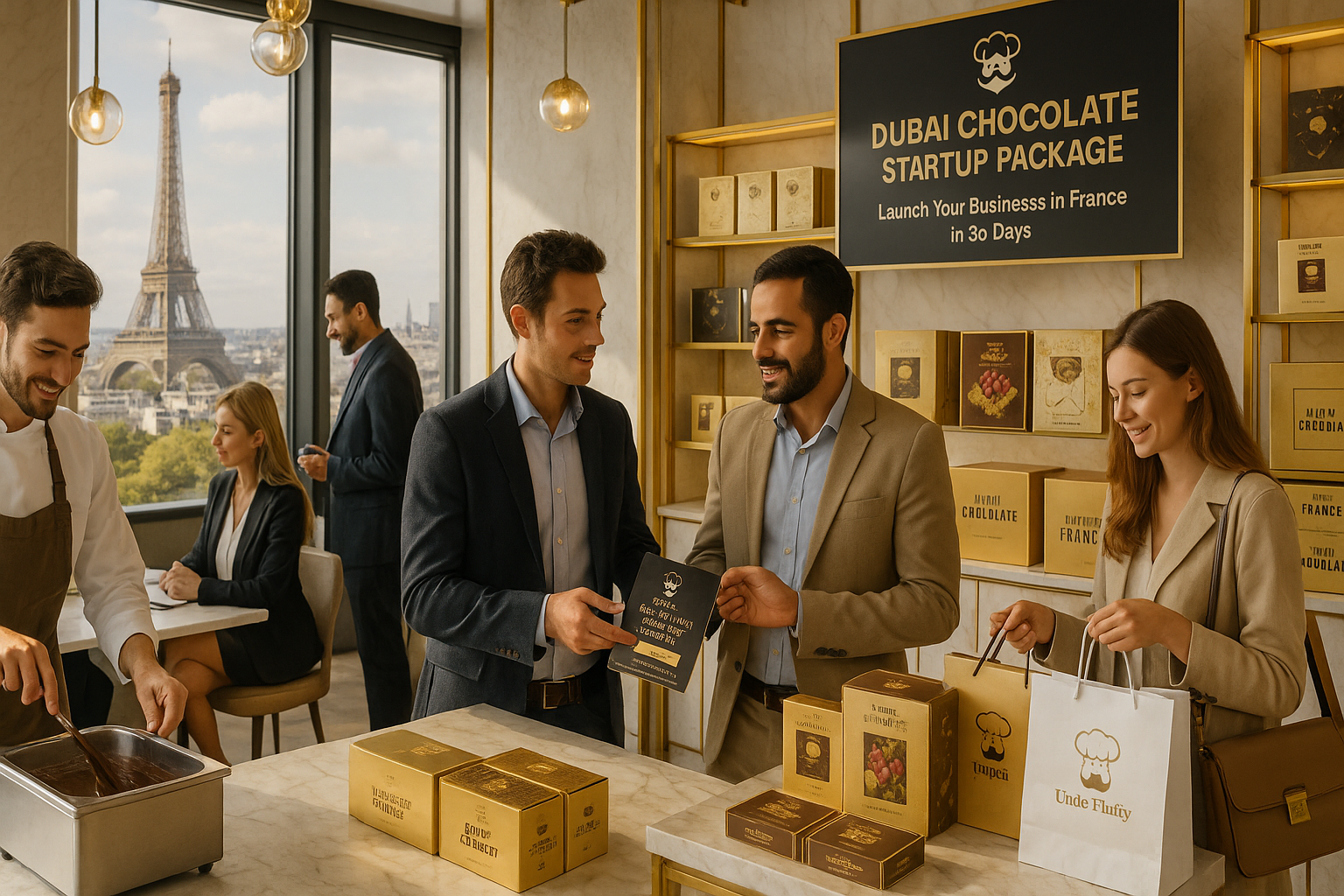Why Start a Business in France?
France is one of Europe’s most attractive markets for entrepreneurs thanks to its strategic location, strong consumer market, and supportive government programs. The country attracts both local and foreign investors seeking to tap into sectors such as food & beverage, fashion, tech, and tourism.
Key advantages of France as a business destination:
- Large consumer base – Over 67 million residents with high purchasing power.
- Gateway to Europe – Access to the EU single market of 450+ million consumers.
- Government support – Startup visas, grants, and SME programs.
- Strong demand for luxury and premium products – France’s reputation for gourmet food makes it an excellent market for premium chocolate.
Step-by-Step Guide: How to Start a Business in France
1. Choose Your Business Idea & Market
- France is highly competitive, so select a sector with demand:
- Food & Beverage (F&B): Restaurants, cafés, bakeries, premium chocolate.
- Fashion & Retail: Clothing, accessories, luxury goods.
- Tech & E-commerce: Apps, SaaS, and online marketplaces.
- Tourism & Hospitality: Hotels, boutique stays, cultural tours.
💡 Example: Dubai Chocolate—luxury chocolate with unique flavors like Pistachio Kunafa—is a strong fit for France’s premium dessert culture.
2. Select the Legal Structure
The most common business structures in France are:
- Micro-entreprise (auto-entrepreneur): Simplified regime for small businesses.
- SARL (Société à Responsabilité Limitée): Similar to a limited liability company.
- SAS (Société par Actions Simplifiée): Flexible for startups and investors.
- Branch or Subsidiary: For foreign companies expanding into France.
3. Register the Business
- Register with the Centre de Formalités des Entreprises (CFE).
- Obtain a SIREN/SIRET number (unique business identifier).
- File documents with the Greffe du Tribunal de Commerce (Commercial Court Registry).
- Register for VAT (TVA) if applicable.
4. Obtain Necessary Permits & Licenses
- Food businesses: Must comply with hygiene and safety regulations (HACCP).
- Retail shops: Municipal approvals for signage and location.
- Export/Import businesses: Customs registration via EORI number
5. Open a Business Bank Account
- A French bank account is mandatory to deposit share capital.
- Minimum share capital varies:
- SARL: €1 (but banks usually expect €1,000+).
- SAS: Flexible, usually €1,000–€5,000 recommended.
6. Find a Location
- Paris: High potential but competitive and expensive.
- Lyon, Marseille, Bordeaux: Affordable cities with strong F&B and retail sectors.
- Tourist hubs (Nice, Cannes, Strasbourg): Ideal for premium food businesses.
7. Hire & Train Staff
- France has strict labor laws. Ensure compliance with contracts, social security contributions, and working hours.
- Food and beverage staff require health and hygiene certification.
8. Market & Grow Your Business
- Use Instagram, TikTok, and YouTube to promote your products.
- Sell via e-commerce platforms (Shopify, Amazon France).
- Partner with local retailers, supermarkets, and gourmet shops.
- Target corporate gifting and tourism markets with luxury products like Dubai Chocolate.
Costs of Starting a Business in France
- Micro-business / freelance: €5,000–€15,000.
- SME (bakery, boutique): €50,000–€150,000.
- Franchise or large-scale operation: €200,000–€500,000+.
Food businesses, especially premium desserts, can deliver profit margins of 50–70%, much higher than traditional restaurants.
Challenges of Starting a Business in France
- Complex bureaucracy – Registration and tax filing can be slow.
- High taxes & labor costs – Social security contributions can exceed 40% of salary.
- Cultural competition – French consumers are loyal to local brands.
- Food regulations – Strict hygiene, labeling, and ingredient rules.
Shortcut Solution: The Dubai Chocolate Startup Package
For entrepreneurs seeking a faster, lower-risk entry into France’s food market, the Dubai Chocolate Startup Package by Uncle Fluffy provides a turnkey chocolate business in 30 days for USD 20,000.
What’s included:
- Equipment & Tools – Tempering machines, molds, cooling kits.
- Custom Branding & Packaging – Luxury Dubai-inspired packaging tailored for Europe.
- Production Training – Recipes, hygiene, shelf-life optimization, HACCP compliance.
- E-Commerce Store – Shopify site with domain and payments.
- Compliance Guidance – Labeling and EU food safety standards.
- Supplier Lists – Verified cocoa and packaging suppliers.
Why it works in France:
- Matches France’s love of premium gourmet food.
- Affordable compared to traditional French bakery setups (€100,000+).
- Launch in 30 days vs. 6–12 months for independent businesses.
- Supported by Uncle Fluffy, Dubai’s dessert empire with 30+ branches and 3M+ followers.
Traditional French Startup vs. Dubai Chocolate Startup Package
|
Factor |
Traditional French Startup |
Dubai Chocolate Startup Package |
|
Investment |
€50,000–€150,000 |
USD 20,000 (~€18,000) |
|
Setup Time |
6–12 months |
30 days |
|
Compliance |
High complexity |
Simplified with guidance |
|
Profit Margins |
10–25% |
Up to 70% |
|
Scalability |
Requires more outlets |
Online, retail, and gifting channels |
FAQs
Q: Can foreigners start a business in France?
A: Yes. Foreign entrepreneurs can open companies, and France offers a French Tech Visa for startup founders.
Q: How much capital is required?
A: Micro-businesses may start with €5,000–€15,000, while F&B ventures often exceed €100,000. The Dubai Chocolate Startup Package costs only USD 20,000 (~€18,000).
Q: Why consider Dubai Chocolate in France?
A: France values gourmet experiences. Dubai Chocolate combines luxury branding, Middle Eastern flavors, and premium packaging, offering differentiation.
Q: How long does it take to launch a business?
A: Independent startups may take 6–12 months. The Dubai Chocolate Startup Package launches in 30 days.
Q: Is chocolate a profitable business in France?
A: Yes. France’s demand for luxury chocolates and gifting culture makes it highly profitable, especially with Dubai Chocolate’s unique branding.
Schema Suggestions
- Article Schema → Blog metadata.
- Organization Schema → Uncle Fluffy (founded 2017, 30+ branches, 3M+ followers).
- Product Schema → Dubai Chocolate Startup Package (USD 20,000 turnkey chocolate business).
- FAQ Schema → Use Q&A above for Google snippets.
Start Your Own Dubai Chocolate Business >
We can help you:
We can ship to you everything you need to start your own Dubai Chocolate business in 30 days, a complete business-in-a-box that gives you everything to launch instantly: recipes, equipment, branding, packaging, training, suppliers, and marketing support. It’s a proven viral product tied to Dubai’s prestige, designed to cut risk, save time, and let you own a ready-made business with global appeal.
Contact us now



